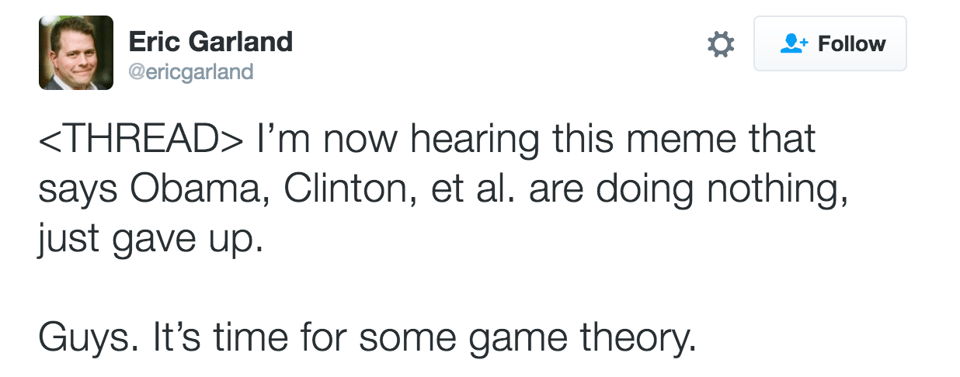Greetings, friends. On December 11, 2016, a little over eight years ago, a guy named Eric Garland posted a long thread on Twitter that quickly became infamous. The thread started out like this:

What followed was something like 125 messages about, among other things, a speculative history of Russian interference in US politics, starting from the turn of the millenium, and running clear through the 2016 US presidential election and its immediate aftermath.
This thread took its author almost two full hours to write. It was regarded by some at the time as brilliantly insightful, but by others as utterly unhinged. Notably, Garland’s rant contained virtually no game theory to speak of. For this reason alone, its opening phrase became an Internet meme.
Well, I want to talk a little about US politics on this, the fourth anniversary of the January 6th insurrection. And guess what.
Guys. It’s time for some game theory.
For this discussion, I will trot out the only game-theoretic concept I have ever learned, which is the Iterated Prisoner’s Dilemma.
The Prisoner’s Dilemma is a theoretical construct concerning two prisoners on trial who might testify against one another to reduce their individual sentences.
If both prisoners remain silent, they each get one year in prison.
If one keeps mum but the other squeals, the rat goes free while the dupe gets three years in the pen.
If they both fink, they each get sentenced to two years.
In the literature, choosing to remain silent is referred to as “cooperation” and turning the other in is known as “defection”.
Game theorists love the Prisoner’s Dilemma the same way ethicists love the Trolley Dilemma, because it reduces their entire domain of inquiry down to a binary choice, which sure is a lot easier to analyze than how to win at realpolitik or whether you should give money to panhandlers.
Long story short, if a prisoner only gets to make this choice once, game theory says the rational decision is always to defect, because defection maximizes availability of the best possible outcome (which is going free). This is known as the non-iterative Prisoner’s Dilemma and it is too trivial to be very interesting.
What is far more interesting is the iterative version of the Prisoner’s Dilemma, where both prisoners get to make repeated choices about whether to cooperate or defect. Quite a bit of research has been done on this over the years, which I will gloss over, except to say that, in the Iterated Prisoner’s Dilemma, it turns out that defection is not always the best strategy.
In 1984, a researcher by the name of Robert Axelrod held a competition to simulate the Iterated Prisoner’s Dilemma using computer programs. The winner was implemented in 4 lines of BASIC and used a tit-for-tat strategy: Cooperate at first, and then do to your opponent whatever was done to you in the previous round. Cooperate when your opponent cooperates; punish them when they defect.
There are a whole bunch of caveats, but it turns out that tit-for-tat is pretty much the optimal general solution to the Iterated Prisoner’s Dilemma, all else being equal. Another, even better, solution in the general case is tit-for-tat with forgiveness, which randomly cooperates instead of defecting, thus potentially breaking an infinite streak of retaliations.
Much like Eric Garland, I am neither an expert in game theory nor geopolitics, and I doubt that I have much that is original to say about either… but I have a hunch participation in human society follows the outlines of the Iterated Prisoner’s Dilemma… and I’m pretty sure that that national politics does, too.
The rule of law is an incredible innovation in human affairs. It is the bedrock of personal security and economic prosperity in any society. It is an innovation that the white(-passing) majority in the United States has been able to take for granted for generations, because the US has had a remarkable run of it (for the most part and even then only for some people).
If you are an American citizen and you don’t believe me, let me ask you: When was the last time you had to pay a bribe to a cop, or to a bureaucrat, say, at the DMV? When was the last time someone you know lost a child to contaminated baby formula? When was the last time someone you know was assassinated in broad daylight for their professed political beliefs?
Before you jump on me to note particular exceptions, my point is that those occurrences have been exceptions in the US for a long time. There are places in the world where these things happen to people on a regular basis.
When the rule of law breaks down, other things can start to as well. Banking systems. Supply chains. Health care. Public utilities. Food security. Personal security. A sizable plurality of the world lives in places that don’t have trustworthy banks or decent hospitals or drinkable tap water.
I can’t help but think that adherence to the rule of law in a two-party political system looks an Iterated Prisoner’s Dilemma. When one side defects, they will keep defecting and reaping the rewards, until they are punished hard enough to make them regret it.
That is not what I see happening right now. It’s January 6th, 2025, and I’ll wager that the people who defected on all of us four years ago will all receive pardons in the next few weeks.
In the post-war era, two political parties in the United States shared power, handing it back and forth peacefully. Each time, there was a trust in the rule of law ensured the loser would regain power eventually. This trust has been so foundational that it is transparent to most of us who have never known anything different in our lifetimes.
Now one of those parties shows every sign of wanting to keep it permanently. They defect and defect, but the other party keeps rushing to the center, keeps trying to cooperate.
When your system of values, your very self-image, is based on being willing always to cooperate for the common good, what do you when your counterparty has ceased to be willing?
What do you do when the other prisoner seems to have forgotten that the dilemma is iterative?

If you’re still reading this, I send you my love. Ceterum censeo vigilum imperdiet cessandam est. More soon.
You just read issue #84 of Greetings, friends.. You can also browse the full archives of this newsletter.
